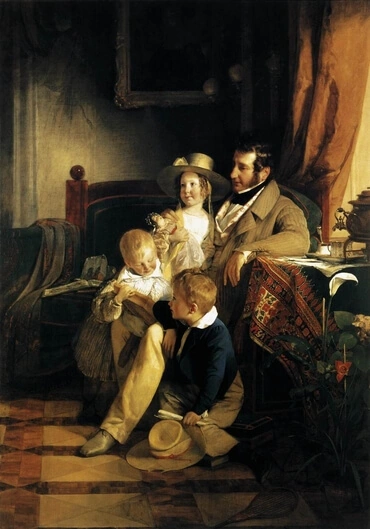1
At sinabi ng Dios kay Jacob, Tumindig ka, umahon ka sa Bethel, at tumahan ka roon; at gumawa ka roon ng isang dambana sa Dios na napakita sa iyo nang ikaw ay tumatakas mula sa harap ng iyong kapatid na si Esau.
2
Nang magkagayo'y sinabi ni Jacob sa kaniyang sangbahayan, at sa lahat niyang kasama. Ihiwalay ninyo ang mga dios ng iba na nangasa inyo, at magpakalinis kayo, at magbago kayo ng inyong mga suot:
3
At tayo'y magsitindig at magsisampa tayo sa Bethel; at gagawa ako roon ng dambana sa Dios na sumagot sa akin sa araw ng aking kahapisan, at sumaakin sa daan na aking nilakaran.
4
At kanilang ibinigay kay Jacob ang lahat ng ibang pinaka dios na nasa kamay nila, at ang mga hikaw na nasa kanilang mga tainga; at itinago ni Jacob sa ilalim ng punong encina na malapit sa Sichem.
5
At sila'y naglakbay; at ang isang malaking sindak mula sa Dios ay sumabayan na nasa mga palibot nila, at hindi nila hinabol ang mga anak ni Jacob.
6
Sa gayo'y naparoon si Jacob sa Luz, na nasa lupain ng Canaan (na siyang Bethel), siya at ang buong bayang kasama niya.
7
At siya'y nagtayo roon ng isang dambana at tinawag niya ang dakong yaon na El-beth-el; sapagka't ang Dios ay napakita sa kaniya roon, nang siya'y tumatakas sa harap ng kaniyang kapatid.
8
At namatay si Debora na yaya ni Rebeca, at nalibing sa paanan ng Bethel, sa ilalim ng encina, na ang pangalan ay tinawag na Allon-bacuth.
9
At ang Dios ay napakita uli kay Jacob, nang siya'y manggaling sa Padan-aram, at siya'y pinagpala.
10
At sinabi sa kaniya ng Dios, Ang pangalan mo'y Jacob; ang pangalan mo'y hindi na tatawagin pang Jacob kundi Israel ang itatawag sa iyo: at tinawag ang kaniyang pangalan na Israel.
11
At sinabi sa kaniya ng Dios, Ako ang Dios na Makapangyarihan sa lahat; ikaw ay lumago at dumami ka; isang bansa at isang kapisanan ng mga bansa ang magmumula sa iyo, at mga hari ay lalabas sa iyong balakang;
12
At ang lupaing ibinigay ko kay Abraham at kay Isaac, ay ibibigay ko sa iyo, at sa iyong lahi pagkamatay mo ay ibibigay ko ang lupain.
13
At ang Dios ay napailanglang mula sa tabi niya sa dakong pinakipagusapan sa kaniya.
14
At si Jacob ay nagtayo ng isang batong pinakaalaala sa dakong pinakipagusapan sa kaniya ng Dios, haliging bato: at binuhusan niya ng isang inuming handog at binuhusan niya ng langis.
15
At tinawag ni Jacob na Bethel ang dakong pinakipagusapan sa kaniya ng Dios.
16
At sila'y naglakbay mula sa Bethel; at may kalayuan pa upang dumating sa Ephrata: at nagdamdam si Raquel, at siya'y naghihirap sa panganganak.
17
At nangyari, nang siya'y naghihirap sa panganganak, na sinabi sa kaniya ng hilot, Huwag kang matakot, sapagka't magkakaroon ka ng isa pang anak na lalake.
18
At nangyari, nang nalalagot ang kaniyang hininga (sapagka't namatay siya), ay kaniyang pinanganlang Benoni: datapuwa't pinanganlan ng kaniyang ama na Benjamin.
19
At namatay si Raquel at inilibing sa daang patungo sa Ephrata (na siyang Bethlehem).
20
At nagtayo si Jacob ng isang batong pinakaalaala sa ibabaw ng kaniyang libingan: na siyang batong pinakaalaala ng libingan ni Raquel hanggang ngayon.
21
At naglakbay si Israel at iniladlad ang kaniyang tolda sa dako pa roon ng moog ng Eder.
22
At nangyari, samantalang tumatahan si Israel sa lupaing yaon, na si Ruben ay yumaon at sumiping kay Bilha, na babae ng kaniyang ama; at ito'y nabalitaan ni Israel. Labing dalawa nga ang anak na lalake ni Jacob.
23
Ang mga anak ni Lea, ay: si Ruben, na panganay ni Jacob, at si Simeon, at si Levi, at si Juda at si Issachar, at si Zabulon.
24
Ang mga anak ni Raquel, ay: si Jose at si Benjamin:
25
At ang mga anak ni Bilha, na alila ni Raquel, ay: si Dan at si Nephtali:
26
At ang mga anak ni Zilpa na alilang babae ni Lea, ay: si Gad at si Aser: ito ang mga anak ni Jacob na ipinanganak sa kaniya sa Padan-aram.
27
At naparoon si Jacob kay Isaac na kaniyang ama, sa Mamre, sa Kiriat-arba (na siyang Hebron), na doon tumahan si Abraham at si Isaac.
28
At ang mga naging araw ni Isaac ay isang daan at walong pung taon.
29
At nalagot ang hininga ni Isaac at namatay, at siya'y nalakip sa kaniyang bayan, matanda at puspos ng mga araw: at inilibing siya ng kaniyang mga anak na si Esau at si Jacob.







